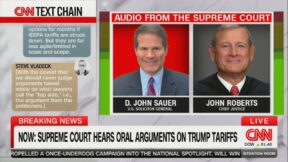‘Hardly Impossible’: NY Attorney General’s Office Rejects Trump’s Claim That He Can’t Pay Bond, Cites Use of Real Estate As ‘Collateral’
A new filing on behalf of New York State Attorney General Letitia James (D) rejected the claim by the legal team representing former President Donald Trump that paying his full $464 million by March 25 was a “practical impossibility.”
The filing, which was submitted on Wednesday by Senior Assistant Solicitor General Dennis Fan, stated that the court should deny Trump’s appeal of the judgment handed down by Judge Arthur Engoron based on their claim that Trump doesn’t have all the cash on hand: “Defendants’ argument that obtaining a full bond is purportedly impossible is based on the false premise that they must obtain a single bond from a single surety for the entire judgment amount of $464 million.”
The filing further says:
Defendants supply no documentary evidence that demonstrates precisely what real property they offered to sureties, on what terms that property was offered, or precisely why the sureties were unwilling to accept the assets. As far as the Court can infer, sureties may have refused to accept defendants’ specific holdings as collateral because using Mr. Trump’s real estate will generally need ‘a property appraisal’ … and his holdings are not nearly as valuable as defendants claim.
But to paraphrase Trump’s team, Fan wrote: “The use of real estate as collateral for an appeal bond is hardly impossible as a general matter.”
MSNBC covered the news, with NBC News Justice and Intel correspondent Ken Dilanian offering this explanation:
Mr. Trump’s lawyers say he does not have the cash liquidity to pay this bond. So they say he would have to liquidate some of his real estate at fire sale prices to come up with the money because people would know he’s in distress. And they would say, they say that that would cause irreparable injury to the former president. The attorney general responded that the alternative essentially would be to stick the state with real estate assets instead of cash to satisfy the bond, and those are hard to sell, and they’re of uncertain value. So the state doesn’t want that. The state wants the cash.
Watch the video above via MSNBC.




